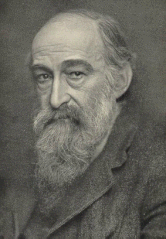Samuel Alexander
 Samuel Alexander | |
| Data i miejsce urodzenia | |
|---|---|
| Data i miejsce śmierci | |
| Zawód, zajęcie |
filozof |
| Narodowość |
brytyjska, żydowska |
| Alma Mater | |
Samuel Alexander (ur. 6 stycznia 1859 w Sydney, zm. 13 września 1938 w Manchesterze) – brytyjski filozof żydowskiego pochodzenia urodzony w Australii. Filozofię studiował w Oksfordzie, a psychologię we Fryburgu Bryzgowijskim. W latach 1893–1924 wykładał filozofię w Manchesterze. Był zwolennikiem teorii ewolucji emergentnej[1] i przedstawicielem neorealizmu.
Publikacje
- 1889: Moral Order and Progress
- 1908: Locke
- 1920: Space, Time, and Deity, Macmillan & Co., reprinted 1966 by Dover Publications, reprinted 2004 by Kessinger Publications: volume one: ISBN 0-7661-8701-2 online version, volume two: ISBN 0-7661-8702-0
- 1921: Spinoza and Time
- 1925: Art and the Material
- 1933: Beauty and Other Forms of Value
- 1939: Philosophical and Literary Pieces, (pośmiertnie)
Przypisy
- ↑ emergentyzm, [w:] Encyklopedia PWN [online], Wydawnictwo Naukowe PWN [dostęp 2023-04-15].
Linki zewnętrzne
- Gifford Lectures:Samuel Alexander (Informacje biograficzne, engl.). giffordlectures.org. [zarchiwizowane z tego adresu (2006-10-04)].
- Emily A.E. Thomas, Samuel Alexander, [w:] Stanford Encyclopedia of Philosophy, CSLI, Stanford University, 8 stycznia 2018, ISSN 1095-5054 [dostęp 2018-01-17] (ang.).
- Emily Thomas, Samuel Alexander, Internet Encyclopedia of Philosophy, ISSN 2161-0002 [dostęp 2018-06-27] (ang.).
 Alexander, Samuel (1859–1938) (ang.), Routledge Encyclopedia of Philosophy, rep.routledge.com [dostęp 2023-05-08].
Alexander, Samuel (1859–1938) (ang.), Routledge Encyclopedia of Philosophy, rep.routledge.com [dostęp 2023-05-08].
Kontrola autorytatywna (osoba):
